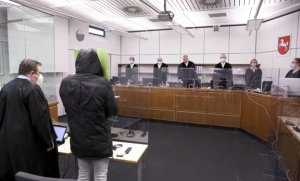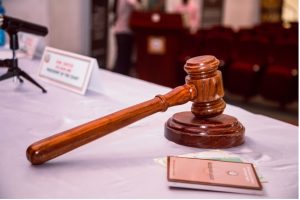By: Rafael Sbeghen Freitas
Impunity Watch Staff Writer
CELLE, Germany – A former participant in the Gambian death squad, an infamous paramilitary group called “The Junglers,” has been handed a life sentence following the Celle Higher Regional Court’s determination of his guilt for crimes against humanity.
 |
The paramilitary organization was established by the former president Yahya Jammeh in the mid-1990s. Jammeh’s 22-year regime was characterized by systematic oppression and pervasive human rights abuses, encompassing torture, extrajudicial executions, enforced disappearances, and sexual violence targeting both real and perceived adversaries.
Court proceedings in Germany revolved around Bai Lowe, a 48-year-old man who was found to be the driver for the “Patrol Team,” a unit of the assassination squad in several of its attacks. Lowe was found guilty of participating in two homicides and one attempted homicide. The latter incident occurred in December 2003, when the court determined that he drove the unit to the location of the attempted assassination of a lawyer who was defending an individual who had fallen out of favor with Jammeh. The victim suffered the loss of a kidney but ultimately survived.
In 2004, the unit, utilizing two vehicles camouflaged as taxis, was responsible for the killing of a prominent journalist, with one of the vehicles being driven by the accused, as per the court’s findings. Subsequently, before the conclusion of 2006, the unit compelled a former soldier, purportedly in opposition to Jammeh, into a vehicle operated by the defendant. They then transported him to an isolated location, where he was shot and buried, according to a court statement.
Bai Lowe’s trial in Germany was made possible by the nation’s legal recognition of universal jurisdiction for severe crimes under international law. This allows the investigation and prosecution of such crimes regardless of where they occurred and the nationalities of the suspects or victims. Given Lowe’s residence in Germany, German authorities were obligated to pursue the case.
The significance of universal jurisdiction cases is growing in international efforts to hold individuals accountable for atrocities, deliver justice to victims lacking alternative recourse, deter future crimes, and prevent countries from becoming safe havens for human rights violators. Numerous European countries are actively engaged in ongoing investigations and prosecutions related to egregious abuses committed abroad, spanning regions such as the Democratic Republic of Congo, Iraq, Liberia, Syria, and Ukraine.
It is expected that authorities in Gambia request Bai Lowe’s extradition from Germany to stand trial. However, the principle of double jeopardy (ne bis in idem) established in international law and the Gambian constitution could preclude Gambia’s judiciary system from bringing charges against him for any of the acts outlined in the current trial indictment.
For further information, please see:
ABC News – Gambian man convicted in Germany for role in killings under Gambia’s former ruler – November, 2023
ECCHR – Verdict in Gambia Atrocity Case – 28 Nov. 2023
Human Rights Watch – Germany: Verdict in Gambia Atrocity Case – November, 2023
Oberlandesgericht Celle – State security proceedings on the suspicion of crimes against humanity in Gambia – March, 2023



